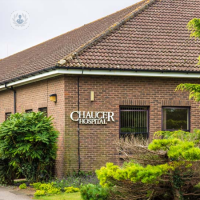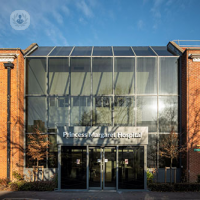What is bowel cancer screening?
Screening aims to determine whether healthy people show any early signs of bowel cancer. Bowel cancer is a common form of cancer for men and women, with approximately 1 in 20 people experiencing it in their lifetime in the UK. Detecting early signs of risk for bowel cancer can ultimately save lives. Bowel cancer in its early stages is more likely to be treated successfully.
What does bowel cancer screening involve?
In the UK, people over the age of 60 are invited to be screened. Following this, you are invited every two years for screening until the age of 75. Screening involves home tests that detect blood in the stool. If you are registered with a GP in the UK, you will automatically be sent this home test after the age of 60.
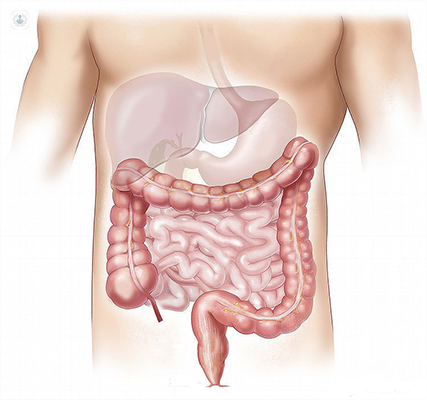
Additionally, at age 55 you are invited for a one-off bowel scope screening test (also known as a flexible sigmoidoscopy) where a thin tube with a camera is used to examine the inside of the bowel. This test can detect polyps, which are small growths that could eventually turn into cancer. If polyps are detected, they can be removed.
Why is bowel cancer screening done?
Bowel cancer screening is offered because it can save lives by detecting early signs of bowel cancer, or your possible risk of developing it. The earlier it is detected, the more successful treatment is likely to be.
Preparation for bowel cancer screening:
For the bowel scope screening, a few weeks before the appointment you will be sent a small plastic pouch containing liquid to perform an enema before the test, as well as instructions on how to do this. On the day of the test you will need to use the enema kit. This will induce a bowel movement before the test. You will also need to wear a hospital gown for the test.
For the home test kit, no preparation is required.
What to expect during bowel cancer screening:
During a bowel scope screening, the camera tube is inserted gently into your bottom to check for polyps. This test is painless, but you might find it slightly uncomfortable. No anaesthesia is required. The test lasts just a few minutes and you return home soon after the test is finished.
The home test kit is for sending a small poo sample to be tested in a laboratory. You will receive instructions on how to take a stool sample with the kit.
What do abnormal results mean?
Following the bowel scope test, if polyps are found you are told immediately following the test. If polyps are found and removed but are not cancerous you might also be offered a colonoscopy to check for polyps elsewhere in the bowel. If cancerous polyps are found and removed, you will be referred to a bowel cancer specialist to discuss treatment.
A normal result from a home test kit would indicate no blood in your stool, with no further action required other than another home test kit in two years’ time. If blood is found in your stool sample you will be offered a colonoscopy to do a more thorough investigation.
Колоректальный скрининг рака
What is bowel cancer screening?
Screening aims to determine whether healthy people show any early signs of bowel cancer. Bowel cancer is a common form of cancer for men and women, with approximately 1 in 20 people experiencing it in their lifetime in the UK. Detecting early signs of risk for bowel cancer can ultimately save lives. Bowel cancer in its early stages is more likely to be treated successfully.
What does bowel cancer screening involve?
In the UK, people over the age of 60 are invited to be screened. Following this, you are invited every two years for screening until the age of 75. Screening involves home tests that detect blood in the stool. If you are registered with a GP in the UK, you will automatically be sent this home test after the age of 60.

Additionally, at age 55 you are invited for a one-off bowel scope screening test (also known as a flexible sigmoidoscopy) where a thin tube with a camera is used to examine the inside of the bowel. This test can detect polyps, which are small growths that could eventually turn into cancer. If polyps are detected, they can be removed.
Why is bowel cancer screening done?
Bowel cancer screening is offered because it can save lives by detecting early signs of bowel cancer, or your possible risk of developing it. The earlier it is detected, the more successful treatment is likely to be.
Preparation for bowel cancer screening:
For the bowel scope screening, a few weeks before the appointment you will be sent a small plastic pouch containing liquid to perform an enema before the test, as well as instructions on how to do this. On the day of the test you will need to use the enema kit. This will induce a bowel movement before the test. You will also need to wear a hospital gown for the test.
For the home test kit, no preparation is required.
What to expect during bowel cancer screening:
During a bowel scope screening, the camera tube is inserted gently into your bottom to check for polyps. This test is painless, but you might find it slightly uncomfortable. No anaesthesia is required. The test lasts just a few minutes and you return home soon after the test is finished.
The home test kit is for sending a small poo sample to be tested in a laboratory. You will receive instructions on how to take a stool sample with the kit.
What do abnormal results mean?
Following the bowel scope test, if polyps are found you are told immediately following the test. If polyps are found and removed but are not cancerous you might also be offered a colonoscopy to check for polyps elsewhere in the bowel. If cancerous polyps are found and removed, you will be referred to a bowel cancer specialist to discuss treatment.
A normal result from a home test kit would indicate no blood in your stool, with no further action required other than another home test kit in two years’ time. If blood is found in your stool sample you will be offered a colonoscopy to do a more thorough investigation.
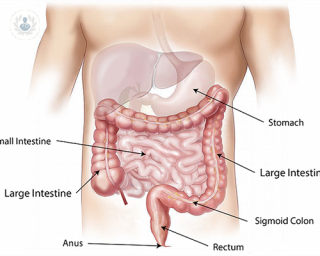

Bowel cancer symptoms: What are the signs to look out for?
Por Dr Nick MacLeod
2024-11-18
Highly respected consultant clinical oncologist Dr Nick MacLeod discusses the most common symptoms of bowel cancer and reveals the associated risk factors in this informative article. подробнее
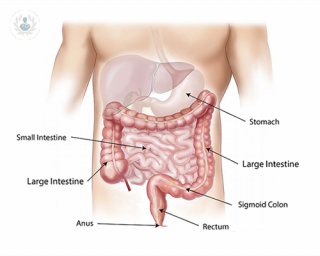

Colonoscopy: How to prepare and what to expect
Por Dr Imran Ghanghro
2024-11-17
Highly respected consultant gastroenterologist Dr Imran Ghanghro gives a detailed guide for patients on what to expect from a colonoscopy in this informative article. подробнее


Preparing for a colonoscopy
Por Mr David McArthur
2024-11-17
A colonoscopy looks for changes inside your bowels and is a diagnostic procedure that can find what's causing symptoms in the area. There’s a certain amount of preparation required from patients. So, what's involved? Mr David McArthur, a leading general and colorectal surgeon in Birmingham, provides a detailed answer in this informative article. подробнее


Можно ли предотвратить рак кишечника?
Por Mr Muti Abulafi
2024-11-16
Discover the symptoms of bowel cancer or what is also known as colorectal cancer with the highly skilled colorectal surgeon Mr Muti Abulafi, and find out what you can do to prevent the onset of the disease. подробнее
Врачи-специалисты в области Колоректальный скрининг рака

The Physicians' Clinic
The Physicians' Clinic
14 Devonshire St, London W1G 7AE
No existe teléfono en el centro.
Si haces uso de este teléfono facilitado por TOP DOCTORS nos autorizas al tratamiento de tu teléfono para fines estadísticos y comerciales. Para más información, lee nuestra Политика конфиденциальности
Top Doctors

The Chaucer Hospital - part of Circle Health Group
The Chaucer Hospital - part of Circle Health Group
Nackington Rd, Canterbury CT4 7AR,
No existe teléfono en el centro.
Si haces uso de este teléfono facilitado por TOP DOCTORS nos autorizas al tratamiento de tu teléfono para fines estadísticos y comerciales. Para más información, lee nuestra Политика конфиденциальности
Top Doctors

The Princess Margaret Hospital - part of Circle Health Group
The Princess Margaret Hospital - part of Circle Health Group
Osborne Rd, Windsor SL4 3SJ
No existe teléfono en el centro.
Si haces uso de este teléfono facilitado por TOP DOCTORS nos autorizas al tratamiento de tu teléfono para fines estadísticos y comerciales. Para más información, lee nuestra Политика конфиденциальности
Top Doctors
-
The Physicians' Clinic
14 Devonshire St, London W1G 7AE, Central LondonЭксперт в области :
- Кардиология
- Дерматология
- гастроэнтерология
- Неврология
- Ревматология
-
The Chaucer Hospital - part of Circle Health Group
Nackington Rd, Canterbury CT4 7AR,, CanterburyЭксперт в области :
- тазобедренный
- Катаракта
- ортопедическая хирургия
- Офтальмология
- коленный
-
The Princess Margaret Hospital - part of Circle Health Group
Osborne Rd, Windsor SL4 3SJ, WindsorЭксперт в области :
- Брахитерапия
- Кардиология
- Общая хирургия
- ортопедическая хирургия
- Роботизированная хирургия
- Дерматология
- See more






